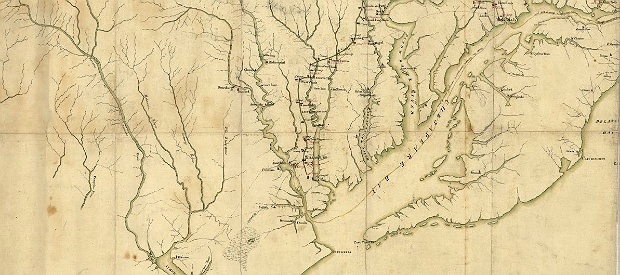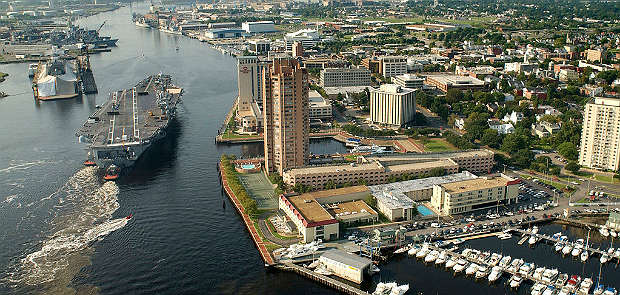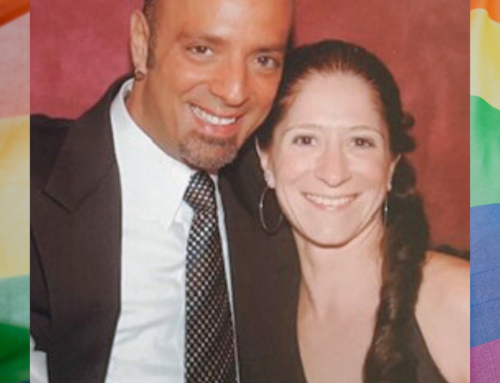Home to the Norfolk Naval Shipyard, Portsmouth, Virginia holds the distinct honor of being one of the world’s only places where aircraft carriers can be dry-docked. But Portsmouth has always been a ship-building city, even when it wasn’t a city.
Under English Rule, Portsmouth’s Naval Value Understood
Separated from neighboring Norfolk by the Elizabeth River, the Portsmouth area has offered shipbuilders easy access to the Atlantic Ocean for almost 400 years. The 20 miles of land running east from Portsmouth to current-day Virginia Beach would have provided natural protection for the valuable fleet planned by John Wood, an English shipbuilder who noticed Portsmouth’s advantageous location in 1620.
King James 1 granted Wood the land soon after, but Portsmouth would become a plantation community before it was made a shipyard in 1767, right after the Revolution began. Andrew Sprowle founded the area’s first dockyard in that year, naming it Gosport Shipyard. Gosport became a bustling hub for merchants and British naval ships, but saw considerable upheaval in the burgeoning American revolution.
British Fires Consume Gosport Shipyard During Revolution
Sprowle, the yard’s owner, was a royalist loyal to the British crown. When things heated up in Virginia, he fled, leaving his shipyard for the new-founded Commonwealth to confiscate. Gosport was subsequently burned to the ground by British forces, but the location, too valuable to neglect, was again being used to build ships by 1794. Five years later, one of America’s first six naval frigates was constructed in the rebuilt Gosport Shipyard.

In this 18th century map of Virginia, the future Portsmouth is labeled simply “Port mouth.”
In 1801, the Commonwealth sold Gosport to the federal government for all of $12,000. Assembly on the nation’s first dry-dock started next, and “Dry Dock One” is still in use in modern-day Portsmouth.
On Eve Of Civil War, Disease Devastates Portsmouth
With the Civil War looming on the horizon, Portsmouth suffered a tragedy straight out of medieval history books. One in three residents were killed by a yellow fever epidemic that ravaged the region in 1855.
The Civil War would only bring more trouble to Portsmouth, but in an unexpected way.
Sleight Of Hand Delivers Shipyard Into Rebel Hands
Gosport Shipyard was Federal property, and its commander, Charles Stewart McCauley, was sympathetic to the Union cause. When the Commonwealth joined the Confederacy, McCauley ordered the shipyard’s burning, fearful that its stocks of ammunition and powerful fleet would fall into Confederate hands. McCauley’s order, however, came too late.
Before any match was lit, a wily ruse orchestrated by engineer and vocal secessionist William Mahone delivered Gosport straight into Southern hands.
Mahone was responsible for the construction of most of Virginia’s railroads, including a line that led through nearby Norfolk. At Mahone’s command, a single passenger train sped into Norfolk’s station, puffing steam and blowing whistles, creating enough of a ruckus to capture the attention of Union troops stationed in Portsmouth. After its arrival, the train quietly pulled out of Norfolk, only to return again and cause another commotion. To the Union soldiers, it seemed like hordes of Confederate troops were flooding the area. They rushed to Norfolk, only to find that the real rebels had captured Gosport Shipyard behind their backs, without firing a single shot.
For the next year, Portsmouth served as a crucial naval command for the Confederacy. History would repeat itself though, as the flagging rebel forces burned the shipyard for a third time before their flight from the area in 1862.
Portsmouth, Virginia Today
While no conflict has touched Portsmouth directly in the last 150 years, the city is still intimately tied to US military efforts. During World War II, the shipyard, renamed the Norfolk Naval Shipyard, doubled in size. Between 1940 and 1945, almost 7,000 naval vessels were constructed in Portsmouth.
Today, Portsmouth has changed its focus to repairing ships, rather than building them. In fact, Norfolk Naval Shipyard is one of the only places that aircraft carriers can be repaired.

The world’s largest serving aircraft carriers, the Nimitz-class, displace 102,000 tons of water (13,600 of the largest elephants!), and that’s not counting the more than 6,000 men and women who work on them. All 9 Nimitz-class aircraft carriers were built right across the James from Portsmouth, in New Port News, Virginia.
In May 2015, the world’s first nuclear-powered aircraft carrier, the USS Enterprise, was moved into its final dry dock in Newport News. Entering service in 1961, the Enterprise was outfitted with 8 nuclear reactors, which provided power to the ship during the Cuban Missile Crisis and all the way to the wars in Afghanistan and Iraq.

Adoption Resources In Portsmouth, VA
Adoptions From The Heart is proud to offer a full range of adoption services from its office in Chesapeake, VA, only 15 minutes south of Portsmouth.
At Adoptions From The Heart, both expectant and adoptive parents will find a wealth of resources to help them on their journey.
Help For Pregnant Women & Expectant Fathers
For expectant parents, AFTH’s caring adoption professionals offer completely free counseling. Providing compassionate guidance with no pressure is the cornerstone of what we do. We’ve helped thousands of pregnant women and expectant fathers make the best choice for themselves, their children and their futures.
Need help finding or paying for prenatal care? We’ve got that covered, too. Our social workers can help you find the medical insurance you qualify for, and connect you with other valuable resources available in the Portsmouth area.
Chesapeake Care Clinic is another great option. Just 20 minutes from downtown Portsmouth at 2145 South Military Highway in Chesapeake, Virginia, the clinic has offered outstanding health care to patients who don’t qualify for medical insurance for over 20 years.
To find out if you qualify for Chesapeake Care’s services, call 757-545-5700.
Support For Prospective Adoptive Parents
Prospective adoptive parents can trust in our decades of experience. We’re one of the East Coast’s largest placing agencies of domestic children, with offices in Virginia, Pennsylvania, New Jersey, Delaware and Connecticut.
We also provide adoption assistance services for families considering a private adoption, including home studies.




